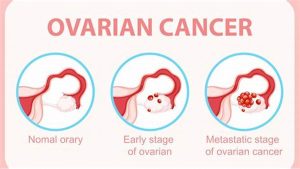Ovarian cancer is a type of cancer that originates in the ovaries, which are part of the female reproductive system. It can be a serious and potentially life-threatening condition if not detected and treated early. Here’s an overview of its causes, prevention, and treatment:

Causes:
- Genetic Factors: Women with a family history of ovarian cancer, particularly those with BRCA1 or BRCA2 gene mutations, have a higher risk.
- Age: Ovarian cancer risk increases with age, especially after menopause.
- Reproductive History: Women who have never been pregnant or who had their first full-term pregnancy after age 35 may be at higher risk.
- Hormonal Factors: Hormone replacement therapy and fertility treatments may slightly increase the risk.
- Endometriosis: Women with endometriosis, a condition where tissue similar to the lining of the uterus grows outside the uterus, may have an increased risk.
Prevention:
- Oral Contraceptives: Long-term use of birth control pills can reduce the risk of ovarian cancer.
- Pregnancy and Breastfeeding: Pregnancy and breastfeeding may reduce the risk.
- Healthy Lifestyle: Maintaining a healthy weight, regular exercise, and a balanced diet rich in fruits and vegetables may lower the risk.
- Surgical Options: Some women at high risk may choose to undergo risk-reducing surgeries such as prophylactic oophorectomy (removal of ovaries) or hysterectomy.
Treatment:
- Surgery: The primary treatment for ovarian cancer involves surgery to remove the tumor, ovaries, fallopian tubes, uterus, and nearby lymph nodes if the cancer has spread.
- Chemotherapy: Chemotherapy may be used before or after surgery to destroy cancer cells and shrink tumors.
- Radiation Therapy: This treatment uses high-energy beams to kill cancer cells and may be used in certain cases, often in combination with surgery and chemotherapy.
- Targeted Therapy: Drugs that target specific abnormalities within cancer cells may be used, particularly in cases where the cancer has spread or returned.
Early detection is crucial for successful treatment, so regular pelvic exams, ultrasound scans, and blood tests may be recommended for women at high risk or with concerning symptoms. Additionally, being aware of the signs and symptoms of ovarian cancer, such as abdominal bloating, pelvic or abdominal pain, difficulty eating or feeling full quickly, and urinary symptoms, can aid in early detection and prompt medical attention.



